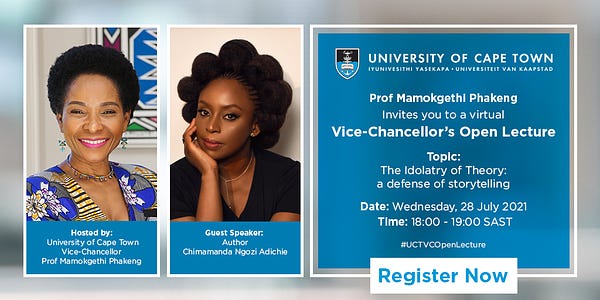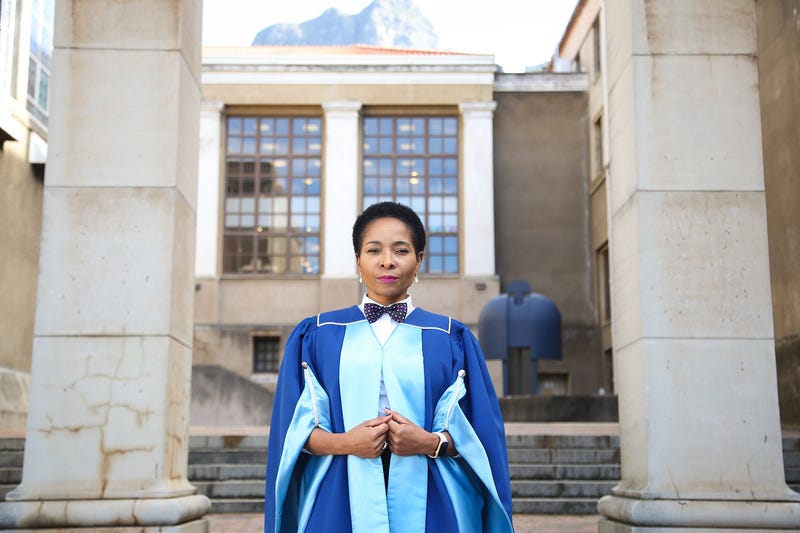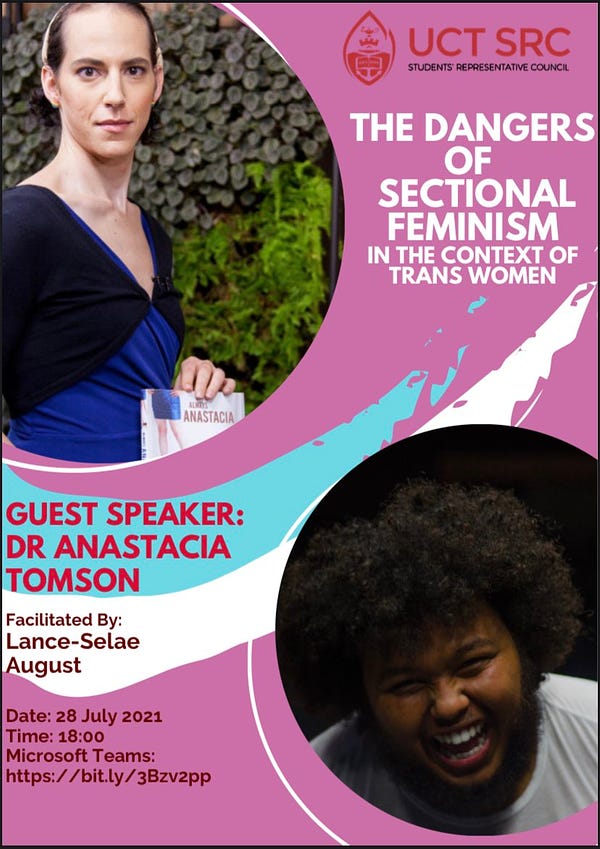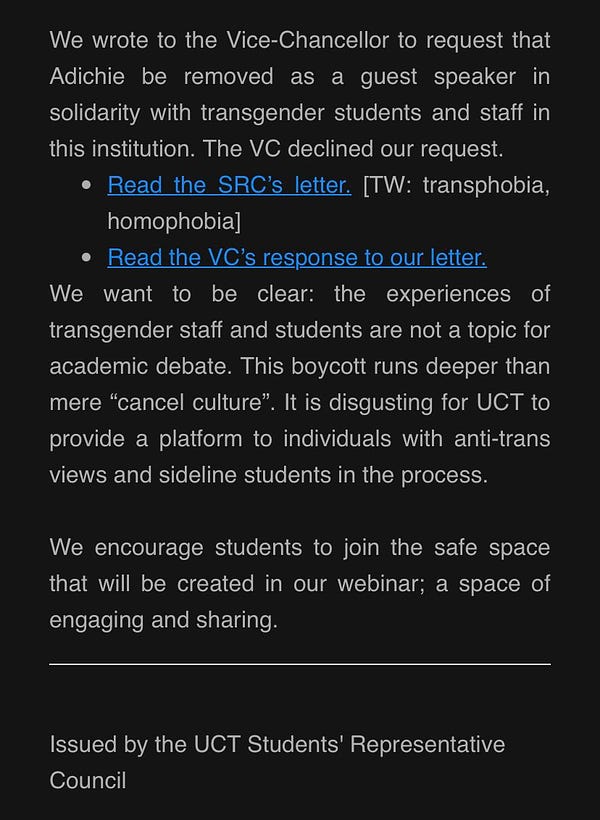On July 28, internationally renowned Nigerian author Chimamanda Ngozi Adichie spoke at South Africa’s University of Cape Town (UCT). Adichie presented the second University of Cape Town (UCT) Vice-Chancellor’s Open Lecture titled The Idolatry of Theory: A Defense of Storytelling to a virtual audience of 5,000 attendees. In the days leading up to the event, UCT’s Student Representative Council (SRC) attempted to have Adichie’s open lecture cancelled, accusing her of transphobia.


On July 26, the SRC posted a statement to Twitter, saying: “In a 2017 Channel 4 interview, Ngozi Adichie openely (sic) voiced out transphobic views towards trans women when she was asked whether trans women are real women and her response was that ‘trans women are trans women’.
As an institution which actively promotes intersectional feminism through its curriculum, it is important for us to recognise that Ngozi Adichie enhanced the divide in the feminist community with her anti-trans remarks, instead of using her platform and influence to highlight how trans women also have a right to simply be recognised as who they are without having to defend their womanhood.”
The SRC attempted unsuccessfully to boycott Adichie’s lecture after the UCT Vice-Chancellor Mamokgethi Phakeng responded in a letter by refusing to cancel the event:
“It is our view that the invitation of internationally acclaimed author and renowned feminist, Chimamanda Ngozi Adichie, to deliver the next Vice-Chancellor's Open lecture, entitled, 'The Idolatry of Theory: a defense of storytelling' in no way diminishes, undermines or changes our ongoing efforts in creating a culture of inclusivity, tolerance and acceptance for our diverse community within the university. Cancelling the lecture will rob us all of the opportunity to share, to express, to learn and to change our minds. The alternative of silencing in our view robs us all of these opportunities.
Vice-Chancellor Mamokgethi Phakeng refused to cave in to the demands of transactivists
“Adichie is known for her LGBTQIA+ rights advocacy in Nigeria. While her advocacy has been controversial, it has to be understood in the full complexity of its context. Further, she has been unequivocal in stating that 'I have and will continue to stand up for the rights of transgender people'. As a university where we must fully embrace the most difficult and challenging conversations, we should only deny people a platform when the grounds for doing so are unequivocal. This is clearly not the case here.”
In response, the SRC hosted a concurrent lecture, scheduled for the same date and time as Adichie’s and titled, “The Dangers of Sectional Feminism”, a presentation by Dr Anastacia Tomson, a trans-identified male from Johannesburg.
Tomson is a general practitioner who has participated in workshops centered on LGBTQIA+ awareness in South Africa. He is the author of a 2016 auto-biography titled, “Always Anastacia: A Transgender Life in South Africa,” which features, on its cover, a photo of a skirt and two legs propped up by glittering high heels. The book’s summary on Amazon states: “I stand in front of the mirror as I remind myself that I don't have to wear the uniform anymore. I don't have to dress myself in men's attire. I can grow out my nails, and paint them with polish. I am finally free to have my ears pierced.”
The extreme rates of sexual violence against women in South Africa led to Interpol in 2012 declaring the nation “the rape capital of the world”, and asserting that “a woman born in South Africa has a greater chance of being raped than learning to read”. The police recorded 42,289 rapes between 2019 - 2020, or an average of 116 incidents per day, and even since Interpol’s jarring turn of phrase, South Africa remains the country with the highest recorded rapes globally. To make matters worse, the violence shows no signs of decreasing, but is continuing to rise, and it is estimated that many more rapes are not reported. While women's groups in South Africa estimate that a woman is raped every 26 seconds, the South African police estimates that a woman is raped every 36 seconds.
It is outrageous, then, that the UCT Student Representative Council not only attempted to silence Chimamanda Ngozi Adichie, but simultaneously platformed a white man who reduces womanhood to stereotypically feminized and sexualized accoutrement, in South Africa, one of the worst countries in the world to be a female, and a nation with a history of European colonization. This decision shows not the dangers of Adichie’s woman-centered feminist view, but rather the perils and pitfalls of “intersectional feminism,” which advocates for the censorship of women to benefit men who objectify women and fetishize female oppression.
During her lecture Adichie asserted that theory without nuance can take the form of idolatry. "If we allow ourselves to be guided too closely by theory, we will end up being blinded by it. My response to the tyranny of theory is to go to the story; go to the human story," she said. She gives a personal example involving a woman who, on sharing her experiences in a conversation on sexism, was silenced by the group. “I suspected even then that we silenced her [the woman] because her experience and her conclusion complicated our accepted theory. Theory gives us a framework to think about the world. But we should not give it primacy because when we do, we start to walk backwards.”
Indeed, gender ideology is like walking backwards, and in high heels. It is a near duplicate inverse of feminist thought which prioritizes misogynist men while aiming to censor forward-thinking women. Gender ideology unabashedly appropriates the language of feminist work and distorts it to once more posit males as the authority figures who are afforded the final word on women’s nature, reality, and lives.
Fortunately, in this instance the SRC succeeded only in making fools of themselves, and thanks to Vice-Chancellor Mamokgethi Phakeng, Chimamanda Ngozi Adichie’s lecture went on as scheduled, and was viewed widely by students at the University of Cape Town.









Well done Vice Chancellor- a brave stance where others have failed. Chimamanda is a heroine. We love her.
HOW? How can they not see that they tried to silence a black woman, and to make everyone pay attention instead to a white man pontificating about what women are? And they claim this is 'social justice'?